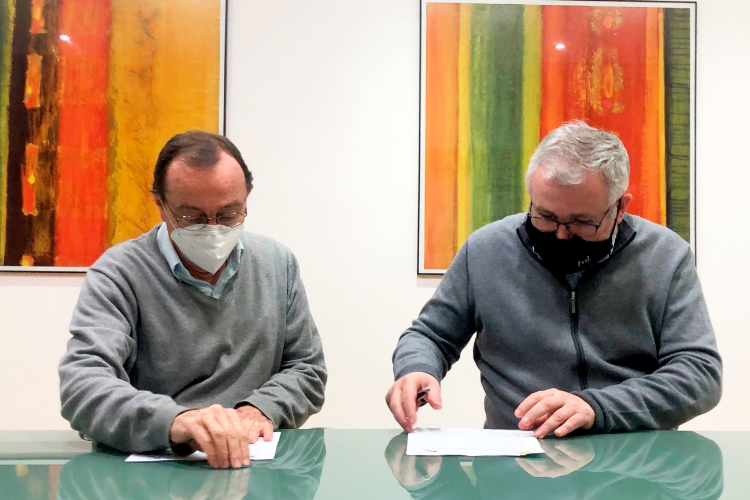On 21 December 2021, Fr. Andreu Oliva, SJ, the current Rector of José Simeón Cañas Central American University (UCA) in El Salvador, visited IQS to meet with the actual Director of IQS, Dr Salvador Borrós and sign an extension of the partnership agreement that the two institutions first established in 2004.

On 21 December 2021, Fr. Andreu Oliva, SJ, the current Rector of José Simeón Cañas Central American University (UCA) in El Salvador, visited IQS to meet with the Director of IQS, Dr Salvador Borrós. Fr. Oliva was able to visit his numerous friends here, see the new facilities at IQS, and sign an extension of the partnership agreement that the two institutions first established in 2004.
Taking advantage of his time in Barcelona, Fr. Oliva gave a lecture on the current reality of El Salvador and the UCA as part of the Loyola Fridays seminars regularly organized by the Department of Ethics and Christian Thought at IQS.
Father Andreu Oliva was born in Barcelona, studied industrial engineering at the UPC, and entered the novitiate of the Society of Jesus in the Central American Province (Honduras, Nicaragua, El Salvador, etc.), where he has since remained. He is currently the Rector of the Central American University in El Salvador. There is a long history of collaboration between IQS and the UCA, which we sought to deepen and solidify during the visit through an extension of the partnership agreement between the two universities.
Extension of the IQS-UCA partnership agreement for the Master's Degree in Chemical Engineering at the UCA
With this agreement, IQS has committed to collaborating with the UCA to create the "Master's Degree in Chemical Engineering" at the UCA, thus becoming the first master's degree in Chemical Engineering in El Salvador and one of the first in all of Central America.
Under the terms of the agreement, IQS is offering its expertise in the Master's Degree in Chemical Engineering, accredited by AQU and ABET, making its teaching staff available to the UCA faculty so they can learn all the teaching and knowledge aspects necessary to earn accreditation from ABET when the time is right. Both institutions also established that the two master's degrees should be the same in terms of content, skills learned, and time and credit distribution, with the aim of being able to offer a dual degree if a student spends time studying at each university.
This agreement enables the UCA to expand its educational offer, especially in the area of master's degrees, as it will be the Faculty of Engineering's first "continuity" master's degree as they are called here to distinguish them from postgraduate master's degrees.
Nonetheless, the master's degree is an ambitious challenge for the UCA as engineers do not traditionally continue their education in El Salvador.
For IQS, this agreement is the culmination of almost twenty years of joint efforts between the faculty at the IQS School of Engineering and the staff with the Department of Chemical Engineering and Environmental Sciences at the UCA. The ramifications of this partnership are tangible in countless aspects, such as the fact that three of the programme's professors earned their PhD at IQS, that three other professors are currently PhD students at IQS, and that the UCA has been able to build the first university chromatography laboratory and the first thermal analysis laboratory in El Salvador. Above all, the intangible outcomes stand out most, considering the strong personal connections that have been created between numerous members of the two institutions.
Dr Rosa Nomen and Dr Julià Sempere deserve special recognition and thanks for their enthusiasm and commitment offered so effectively over so many years. Thanks to them, this collaboration has been a great success and will continue to be so in the future.










